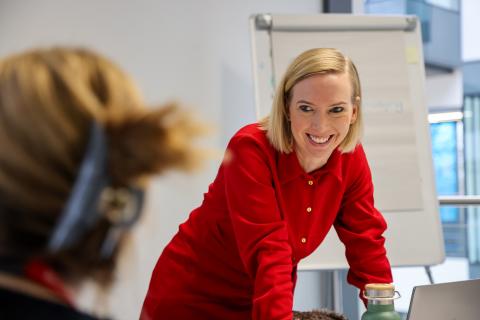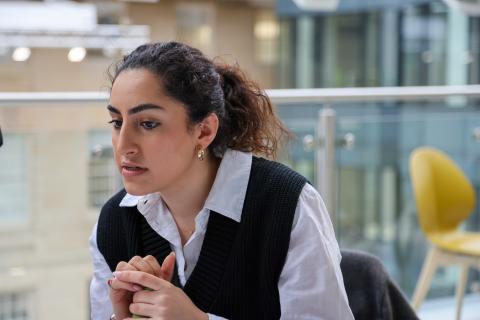Michael Barrett:
It's challenge three and we’re at Wiltshire Council in the South West and the challenge here is all about the Household Support Fund and cost of living. So a really live and emotive subject.
Virginia Ponton:
And the council have just set their task to the contestants, so they will spend the next day meeting expert officers and partners to start to work on their proposals and presentation.
Will Oulton:
It's a large rural authority with 18 different market towns. It’s got a canal going across it and a large boater community and smack bang in the middle with Salisbury Plain, we have a large military area around 30,000 military people living here. So today we've set the challenge of looking at the Household Support Fund. And chiefly what should we do as a local authority if the Household Support Fund ceases.
Cllr Richard Clewer:
And it's about how we meaningfully provide intervention in a way that is driven by data, is driven by interventions that will actually be preventative, and not a sticking plaster. By no means a simple challenge.
Helen Gelder:
The Household Support Fund is funding that is being given to councils by the Government to support a community with a number of challenges that they have in terms of cost the living. There’s a focus on a number of factors including food poverty, white goods, energy, fuel poverty.
Ramisa Yazdani Biouki:
So we've discovered that it's a much bigger issue. There is about £5.4 million coming into Wiltshire and about £2.2 million of that goes to free school meals. So we're trying to figure out how can we plug that gap once that funding ends.
Hannah Barton:
We've had quite a lot of different kinds of breakout sessions, and then I’ve just been to another session with the Libraries Manager, and that was more about the role that libraries play more widely in the community, not only are they a warm space, and the Libraries Manager described it as like a living room of the town.
Marelize De Beurs:
So far, we've met some really interesting community organisations. In talking to them we just really feel the need, they talk about their client and about the people specific cases and their genuine concern with this funding going.
Jack Pearce:
In terms of outputs today we are trying to pull together a four-page cabinet report with our recommendations and then a presentation followed by a Q&A. They seem very keen on evidence based working here in Wiltshire so I think that's going to be really key.
Martin Chastney:
I confess I do quite like looking at a graph but there has been an awful lot of data and the challenge is trying to distil that down and get to the points which are critical and to tell the story. We had a meeting with some of the officers of the council who are delivering the programme here. We discussed their rationale for how they want to target the funding, what they believe are the risks the benefits and the impacts that they’re having.
Marelize De Beurs:
We’ve had a very productive day of brainstorming and coming up with our skeleton plan. We’re taking a quick little break, and then we’re off to have dinner with some stakeholders and senior representatives from the council.
Ramisa Yazdani Biouki:
It’s about 10:30 p.m. at night. We’ve all gone to our rooms to get ready for bed, but about 30 minutes ago, we hit that sweet spot where all of a sudden all of us were on the same page and we completely understood what we’re going to propose. Fingers cross for tomorrow.
Virginia Ponton:
And this is a national issue that the contestants are dealing with on this challenge. There will be different experiences from each council, and cost of living is something that obviously resonates with everybody in their personal life too, so we're expecting the teams to bring lots of different fresh ideas and perspectives for Wiltshire Council.
Michael Barrett:
There’s a mixed level of experience around the Household Support Fund across both teams and the captains seem to be leaning into that a little bit. It's really interesting to see how all the cohort are going to learn tonnes on this challenge and take that back to their council and their own roles.
Che-kwon Sterling:
At my council, I’m going to go away and I’m going to speak to the leadership team to understand what our plans are once HSF comes to an end. I’m also going to share and showcase what I’ve pulled together with team Victorious.
Kerry Challoner:
We spoke to some of the Directors. One of the things we found about Wiltshire Council is that they are really good at quite a lot of things and quite a lot of our ideas, when we spoke to people, they'd already been done. So, I think they are really ahead of the game and unfortunately that's meant some of our plans have changed this morning.
Faith Scott Deuchar:
I'm finding to this challenge really hard, I think it's such a big area. There's no easy solution to how you replace £5,000,000 of funding, and that means that there's no quick fix that we can suggest. So, I found this really really challenging, but probably a good test working in an area I'm not that familiar with.
Adam Towers:
Our initial idea was for the council to match spending on free school meals over the course of nine years which senior officers thought was a little too ambitious. So we started off with three massive ideas and gradually they've been whittled down to just the one.
Marelize De Beurs:
So our solution is called the One Wiltshire Network, acronym is ‘OWN’, which will build on existing smaller cost of living network that will bring in the larger employers and private sector, alongside health, charity and voluntary sector.
Ramisa Yazdani Biouki:
We are prioritising food insecurity and housing instability. We will fund this through social value and strengthen the procurement processes and we will manage this through our new strategic partnership board.
Cllr Ian Blair-Pilling:
We chose team Dynamic. We felt that although they both produced very high-quality solutions, it was Dynamic who had the greater part towards what we were looking for. And what ideas would we take forward? Well Team Dynamic had a very good proposal around forming a One Wiltshire Network involving pretty well all the agencies and commerce and all the communities that you could think of help to raise resources and work towards solutions. We would want to draw on both teams’ ideas. The whole exercises is of value, not just to the contestants, but to Wiltshire Council and our staff.
Ramisa Biouki Yazdani:
I really enjoyed myself on this challenge. I pride myself on the fact that we were all quite happy and chatty and got on really well with each other, there were no tensions. And I hope that that goes a long way into my journey as a leader.
Marelize De Beurs:
They were just all superstars on the team and just all worked together really well. Very collaborative, very supportive, and it was just a joy from the beginning to the end. Even though we found the subject matter incredibly difficult. But it does feel amazing to be recognised for the effort we put in and for the ideas we came up with.



